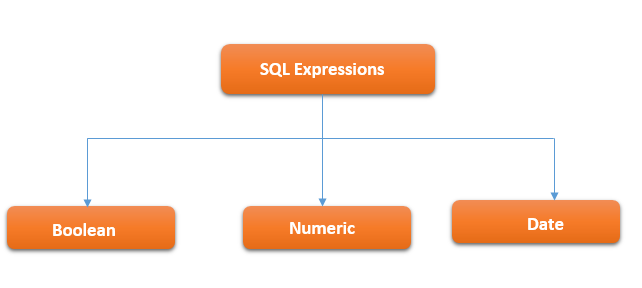SQL Expressions are combination of one or more values, operators and SQL functions that evaluate to a value. These SQL EXPRESSIONs are similar to a formula and they are written in query language. You can also use them to query the database for a specific set of data.

SQL Expressions broadly can be divided into the following three categories.
- Boolean
- Numeric
- Date
SQL Expressions syntax
Following is the basic syntax of SQL Select statement along with Expression.
SELECT column1, column2, columnN FROM table_name WHERE [CONDITION|EXPRESSION];
SQL Boolean Expressions
SQL Boolean Expressions fetch the data based on the matching a single value. That means that the query should returns only one row when executed.
Syntax
The syntax of the SQL Boolean Expression is as follows.
SELECT column1, column2, columnN FROM table_name WHERE SINGLE_VALUE_MATCHING_EXPRESSION;
Example
Consider the following employee table.
| EmpId | EmpName | Address | Age | Salary |
| 101 | Sagar Sharma | Kolkata | 30 | 80000 |
| 102 | Ramesh Patil | Mumbai | 35 | 65000 |
| 103 | Piyush Roy | Siliguri | 36 | 40000 |
| 104 | Sneha Sharma | Delhi | 28 | 70000 |
| 105 | Shankar Kumar | Delhi | 32 | 48000 |
SELECT * FROM Employee WHERE EmpId = 105;
The above query result returns the row where EmpId is 105. In our case it will returns only one record with EmpName as 'Shankar Kumar'. SQL Boolean expressions should be used with the table’s primary key to get a single record.
SQL Numeric Expressions
SQL Numeric Expressions are used to perform any mathematical operations in any SQL query.
Syntax
Following is the syntax of SQL Numerical Expression.
SELECT numerical_expression as OPERATION_NAME FROM table_name [WHERE CONDITION] ;
Here, numerical_expression is a mathematical formula.
Example
Lets understand the concept of SQL Numerical Expression with an example.
SELECT count(*) AS TOTAL_EMPLOYEE FROM Employee; -- 5
The above query will return 5 because we have used an numerical expression count() which counts the total number of the employees in the employee table. You can customize the query as per your requirement. For example, get the total number of employees whose salary is more than 50000. In this case, we can use the following query.
SELECT count(*) AS TOTAL_EMPLOYEE
FROM Employee
WHERE salary>50000; -- 3
Some of the others code snippets of SQL Numerical Expression as follows:
SELECT sum(Salary) FROM Employee; -- 303000 SELECT min(Salary) from Employee; -- 40000 SELECT max(Salary) from Employee; -- 80000 SELECT avg(Salary) from Employee; -- 60600
SQL Date Expressions
SQL Date Expression returns current system date and time value.
Let’s understand SQL Date Expressions with some SQL statements.
SELECT CURRENT_TIMESTAMP; -- 2021-04-11 20:10:12 -- For MYQSL SELECT now(); -- 2021-04-11 20:10:12 -- For SQL Server SELECT GetDate(); -- For Oracle DB select sysdate from Dual; -- 11-APR-21
The above SQL statement returns system current data and time. Note that for different database vendor the statement is different to get the current system date and time.
Summary: In this tutorial, you have learned about SQL Expressions. Basically there are three types of SQL Expressions. They are Boolean, Numeric and Date.
